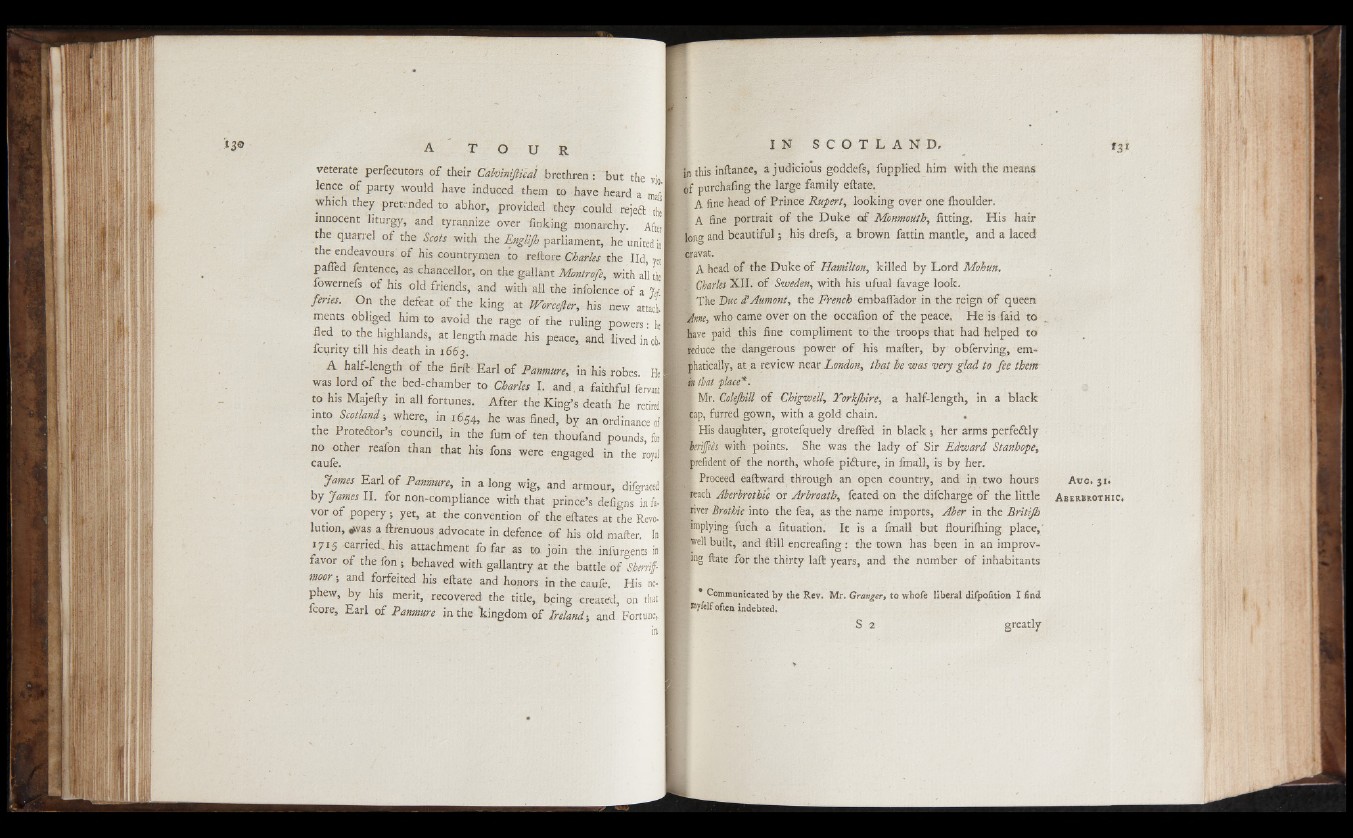
veterate perfecutors of their Calviniftical brethren: but the vio
lence of party would have induced them to have heard a mafs
which they pretended to abhor, provided they could reject the
innocent liturgy, and tyrannize over finking monarchy. After
the quarrel of the Scots with the Englijh parliament, he united in
the endeavours of his countrymen to reftore Charles the lid, m
pafled fentence, as chancellor, on the gallant Montrofe, with all tie
fowernefs of his old friends, and with all the infolence of a U
feries. On the defeat of the king at Worcefier, his new attach'
ments obliged him to avoid the rage of the ruling powers' k'
Red to the highlands, at length made his peace, and lived in ok.
fcurity till his death in 1653.
A half-length of the firftEarl of Panmure, in his robes. He
was lord of the bed-chamber to Charles I. and, a faithful fervant
to his Majefty in all fortunes. After the King’s death he retired
into Scotland-, where, in 1654, he was fined, by an ordinance of
the Protestor's council, in the fum of ten thoufand pounds, for
no other reafon than that his fons were engaged in the royal
caufe.
James Earl of Panmure, in a long wig, and armour, difgraced j
by James II. for non-compliance with that prince’s defigns in favor
of popery; yet, at the convention of the eftates at the Revo-J
Jution, #vas a ftrenuous advocate in defence of his old mafter. In
1715 carried, his attachment fo far as to join the infurgents in
favor of the fon ; behaved with gallantry at the battle of Sherrifl
moor; and forfeited his eftate and honors in the caufc. His nephew,
by his merit, recovered the title, being created, on that
fcore, Earl of Panmure jnthe kingdom of Ireland-, and Fortune,
in this inftanee, a judicious goddefs, fupplied him with the means
of purchafing the large family eftate.
I A fine head of Prince Rupert, looking over one Ihoulder.
I a fine portrait of the Duke of Monmouth, fitting. His hair
joncr and beautiful 5 his drefs, a brown fattin mantle, and a laced
cravat.
b A head of the Duke of Hamilton, killed by Lord Mohun.
■ Charles XII. of Sweden, with his ufual favage look.
I The Due d’Aumont, the French embafiador in the reign of queen
%nne, who came over on the occafion of the peace. He is faid to
have paid this fine compliment to the troops that had helped to
{educe the dangerous power of his mafter, by obferving, emphatically,
at a review near London, that he was very glad to fee them
k that place*.
■ Mr. Colejhill of Chigwell, Yorkjhire, a half-length, in a black
' cap, furred gown, with a gold chain. .
■ His daughter, grotefquely drefied in black ; her arms perfeitly
Wherijees with points. She was the lady o f Sir Edward Stanhope,
prefident of the north, whofe pifture, in fmall, is by her.
B Proceed eaftward through an open country, and in two hours
j reach Aberhrothic or Arbroath, feated on the difcharge of the little
? fiver Brothic into the fea, as the name imports, Aber in the Britijh
implying fuch a fituation. It is a finall but flouriihing place,'
■well built, and ftill encreafing : the town has been in an improv-
■ing ftate for the thirty laft years, and the number of inhabitants
I * Com municated b y th e Rev. Mr. Granger, to w h o fe lib e r a l d ilp o fitio n I find
■myfelf often in d eb ted .
S 2
A u c . 3 1 ,
A b e r b r o t h i c ,
greatly